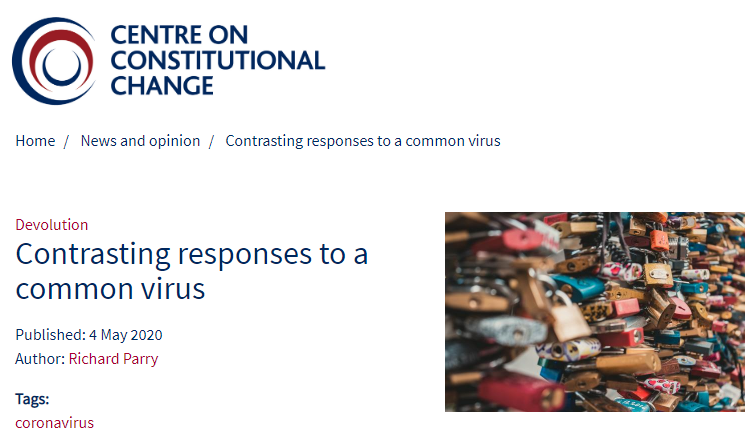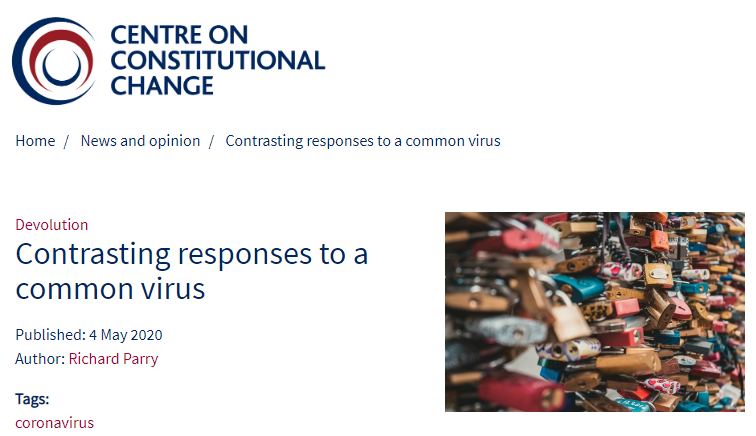
In practice, divergence has been limited, and UK networks strong. Scottish policies on the banning of mass gatherings (13 March), on the written analysis of the criteria for relaxing restrictions (23 April) and on the use of face masks (28 April) have taken the form of licensed anticipations of UK positions.
Richard Parry, Honorary Fellow
Some thoughts from Brenda Steele on the above quote by Richard Parry:
Why is it that these people feel they have the right to impute motives to the Scottish Government for which they have absolutely no evidence?
Why does the Scottish Government have to hold back on things it wishes to do?
Not only does Parry have no evidence for the convergent thinking he imagines, he seems unaware of quite divergent actions taken by the Scottish Government such as setting-up the 50 coronavirus ‘hubs’ or assessment centres, which have diverted cases away from GPs. Further, why as a researcher, has he not considered the historical divergence in health policy which has meant that Scotland entered the epidemic in a very different place from that of ‘Rumpuk’ and now has far fewer deaths? For example, the rejection of the outsourcing of cleaning and catering more than 10 years ago, but now the norm in England, has probably reduced infection levels as evidenced by the recent Norovirus and listeria outbreaks in England not occurring in Scotland. Also, has the higher staffing resource in Scottish hospitals not been the result of divergence?
Parry has previous in terms of negative thinking about Scotland. He wrote in January 2020, on how Brexit would make Scottish independence more challenging:
Outside common Scottish and rest-of-UK membership of the EU, these issues multiply. Disputes over Scottish trade access to England (and its Empire) in the 1690s led to the Union of 1707 and would have to be revisited in the contemporary economy. The association between independence and ‘separation’ in all its aspects could be made much more forcibly than in 2014.

The single quote marks around ‘Scottish’ in your description of Parry may or may not be justified. But I suggest they might better be applied to the word ‘academic’. No academic worthy of the name would work backwards from a conclusion as Parry is evidently in the habit of doing. It is all too apparent that he has arrived at a highly negative conclusion regarding Scotland informed only by prejudice, and his ‘research’ involves manipulating or inventing ‘evidence’ that supports his ‘findings’.
Given the kind of ‘dubiety’ associated with this punctuation that’s a lot of single quotes for one ‘academic’.
LikeLiked by 1 person
I have seen some talk that the track and trace part of the UK government strategy will be done centrally using a call centre. That is unlikely to be a Scottish approach. If the use of a call centre is UK strategy there will be significant divergence in Scotland from the use of an app and a call centre.
LikeLiked by 2 people
Have you any link or evidence abut WM plans? A cetralized expensive ineffective method run at a profit by one of their mates or a big funder would be just their style.
We already know that the Scottish Government has been exploring other (local and probably more effective) avenues.
LikeLiked by 1 person
This gives fullsome technical details of the proposed UK Covid-19 ‘proximity’ app being managed by NHSx. Interestingly, it’s written by the Technical Director of the UK National Cyber Security Centre – an indication of the ‘sensitivities’ around it?
Click to access NHS-app-security-paper%20V0.1.pdf
LikeLiked by 1 person
It seems that Serci and G4S are in the frame. This is from The Times 3 days ago.
https://www.thetimes.co.uk/article/coronavirus-private-call-centres-will-run-new-contact-tracing-system-bjqnpsxqc
“The contact tracing system crucial to hopes of easing lockdown will be outsourced to private call centre operators including Serco, The Times has learnt.
The bulk of contact tracing work will be contracted out to at least two companies who are being asked to provide about 15,000 call centre staff.
They will be given about a day of training in the principles of and a script to handle conversations with people who have been at close quarters with confirmed cases.”
The rest of the article requires subscription.
Then this from the Morning Star, taking its lead from The Times and expanding on it.
Last year, Serco was fined nearly £23 million as part of a settlement with the Serious Fraud Office over an electronic tagging contract with the Ministry of Justice. Both Serco and G4S were accused of charging the government for electronically monitoring people who were either dead, in jail or had left the country.
Serco has also been embroiled in a number of other scandals, including falsifying NHS records to meet targets at a Cornwall out-of-hours GP surgery.
Campaign group We Own It director Cat Hobbs said that it was “beyond belief” that the firms were in line for the contracts.
“Whether it is falsifying NHS data or staffing breast-cancer screening hotlines with staff who’ve only had an hour’s training, Serco’s track record shows that it is utterly unfit to play any role in our NHS.”
Shadow health secretary Jonathan Ashworth also criticised the plans, arguing that the public will not want to see the system “in the hands of private companies seeking to make a profit.”
Slugger O’Toole has a piece about the respective effectiveness of the UK tracing app and the Irish tracing app. You may have guessed already that the Irish tracing app is much more effective and that NI should use the Irish app rather than the UK one.
“Therefore, phones using the UK government app will generally only be able to transmit to other phones if they are unlocked and the app is being used, whilst apps using the decentralised approach such as the Irish government app will be able to register contacts with other users even if both phones are locked or the app is in the background….
….The proposed UK system will rely heavily on many people installing the app on Android phones that are more than three years old. If the UK decided to adopt the decentralised approach, it would be able to avail of the Exposure Notification API, and these issues would not exist. The percentage of people running older versions of Android will naturally fall over time as people upgrade their phones.
Whilst Google and Apple generally only allow one contact tracing app per country, flexibility is being shown where one country can have different systems, for example different states in the United States. If the UK government cannot be dissuaded from pursuing their current approach, then Northern Ireland should follow the much more effective strategy of using a decentralised approach and align with the Republic.”
https://sluggerotoole.com/2020/05/05/if-the-uk-doesnt-change-its-disastrous-contact-tracing-app-strategy-northern-ireland-should-align-with-the-irish-government-approach/
LikeLiked by 1 person
As far as health data goes,I seem to remember,not too long ago a stushie about Google being handed “anonymous” patient data from English GP practices.
There is no question in my mind that this is being done as part of a longer term Tory strategy to accommodate American Pharma in their health services and that the deployment of this Corona app is also plays a role.
The main thing that is upsetting the Unionists in Scotland is that this crisis has highlighted the fact that the Scottish Government is responsible for health in Scotland and Westminster responsible for health in the UK of E.
The fact that SEPARATE policies might be deployed is unthinkable to the one nation Brit Nats.
Hence people like CarJack being fixated with lockstep processes.
Ein volk,ein reich…..
LikeLiked by 1 person
“Outside common Scottish and rest-of-UK membership of the EU, these issues multiply. Disputes over Scottish trade access to England (and its Empire) in the 1690s led to the Union of 1707 and would have to be revisited in the contemporary economy. The association between independence and ‘separation’ in all its aspects could be made much more forcibly than in 2014.”
One question: “Empire”? What “Empire”?
LikeLike